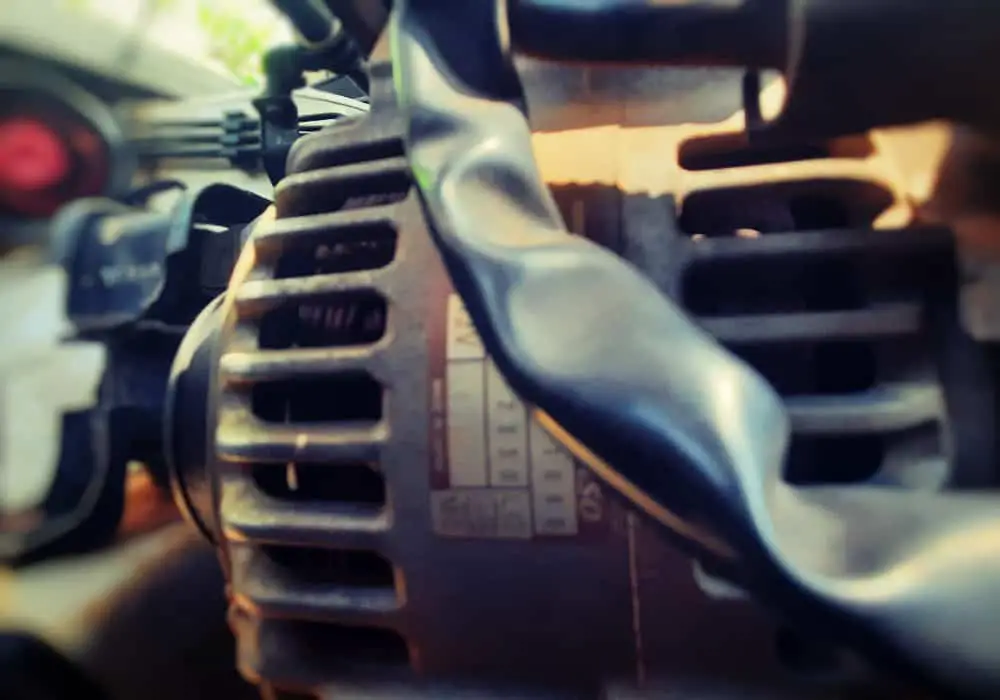While for the most part, a car alternator can run reliably and silently for hundreds of thousands of miles never once failing on you, there might be a case of an alternator showing signs of failure such as giving off unusual noises when running.
Fortunately, the causes of this bearing noise are preventable in some cases.
This post lists the likely causes of alternator-bearing noise (some are preventable), provides guidance on whether you should drive with a bad alternator bearing, and helpful tips on how to stop the noise.
1. What Causes the Noise from the Alternator Bearing?
If there’s noise from the alternator as it runs, it is quite probable that the alternator has suffered damage and is no longer running smoothly. This may be because:
a. The alternator belts have been tightened tightly damaging the bearings
Some alternator bearing faults are a result of the drive belt being tightened too tightly. Note, the failure may not be immediate but over several months of usage when it develops the occasional squeak.
When replacing a drive belt, fit it right with the correct tension – refer to the manufacturer’s instructions to make sure the belt is aligned and fixed with the recommended tension.
b. Alternator bearing is continuously exposed to Water
While alternators are usually protected from direct exposure to water by the nature of their design and location in the engine bay, continually driving through high water can lead to the gradual removal of the lubricating grease in the bearing. This then accelerates damage to the bearing.
c. Normal wear and tear over several thousand miles of usage
This is likely to happen when a car has covered several tens of thousands of miles from wear and tear. That said, some alternator bearings can last longer.
2. Signs of a Bad Alternator Bearing
If an alternator is damaged, you’ll likely observe any of the following signs:
a. Abnormal sounds such as squeaking, whining, grinding, or growling from the worn alternator as it runs
If the car alternator bearing is damaged then you’ll be able to hear a range of unusual sounds as opposed to the smooth running of the alternator that is usually not distinguishable from the sound of a running car engine.
Abnormal sounds may increase in intensity with acceleration or frequency over time
Keep in mind that this sound may initially be occasional before progressively getting louder and more regular each time the car engine/alternator runs or as the car accelerates.
b. The car alternator pulleys run unevenly
In addition to the abnormal sounds, the alternator bearings may not be able to run smoothly.
3. Tips to Fix the Alternator Bearing Noise
First, confirm that indeed the sounds are from the alternator. To fix the bearing noise and get the alternator running smoothly and silently, it’s probably best to replace the bearing or alternator altogether depending on the extent of the damage for peace of mind
Use a competent auto workshop to diagnose and replace the damaged bearing. Make sure that the replacement alternator is mounted firmly. Replace the drive belts too.
Replace the bearing with another with the matching part number, making sure to use the proper tools.
You may also be interested in this Post: 7 common symptoms of a short in the alternator.
4. How Long a Bad Alternator Bearing Lasts
It is difficult to say how long or how far you can drive with an alternator that has a bad bearing.
It largely depends on the extent of the fault, and how often you use the car.
In the early stages of the fault causing the bearing noise, the noise may only be occasional, and, may be able to get away with driving for days, or even longer.
Beware of the risks though. The damage can get progressively worse should you continue driving the car in this condition.
In extreme cases, the alternator can overheat, probably seize up and suffer permanent damage to the alternator.
Do not drive with a suspected bad bearing. Not only do you risk getting stuck at the roadside and calling for a tow, but there is also a danger that the alternator will be damaged too.
5. New Alternator Making a Whining Noise – Is This Normal?
If you hear the whining sound from an alternator – important to confirm that it is indeed from the alternator.
The whining of an alternator is not normal. Contact the supplier. You may need to have it replaced.
6. Not all Unusual Noises are from The Alternator Bearing
Last but not least, not all grinding, squeaking, or whining sounds are from the car alternator bearing. They could be from the water pump bearing, blower bearing, or another part that is worn or requires lubrication under the engine bay.
Therefore take time to locate the source of the unusual sound – it may not be from the alternator!
Closing Thoughts
If the alternator has a bad bearing then you’ll likely hear some unusual sounds as the alternator runs.
Some of the sounds you’re likely to hear include squeaking, whining, or grinding. These sounds may increase in intensity with the acceleration of the car engine.
Besides normal wear and tear, damage to the alternator bearing may be caused by an overtightened belt or continued exposure of the alternator bearings to water.
Recommended Posts
